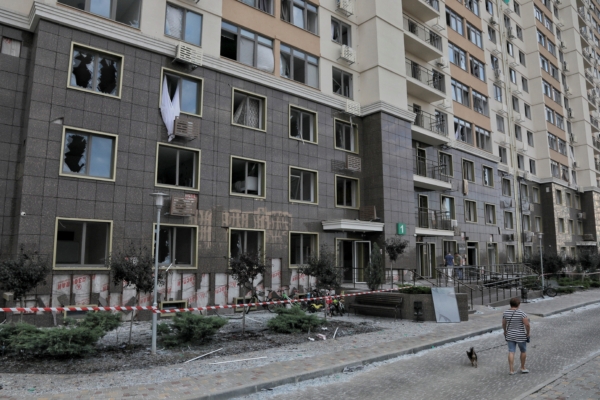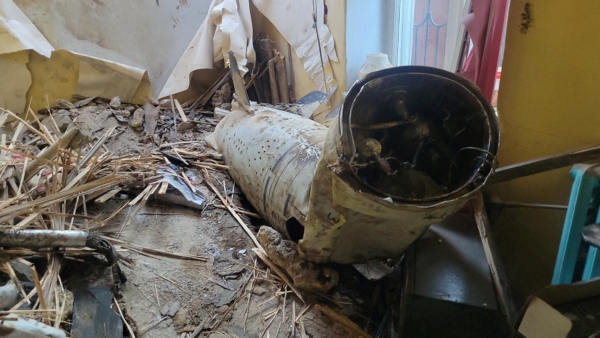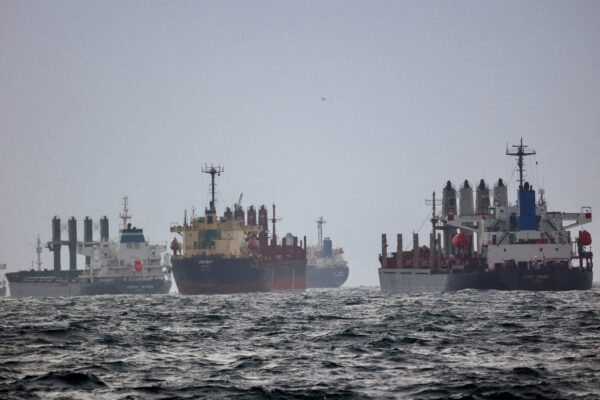


Russia launched overnight missile and drone strikes on Ukraine damaging Chinese consulate building and infrastructure of Odesa port that has a million tons of grains to be shipped to Asia and Africa, including 60,000 tons to China. The Chinese communist regime has not condemned Russia for the attacks.
Russia has launched its attacks on the southern Ukraine Black Sea port city and other Ukrainian ports for four nights in a row from July 18.
A Chinese consulate building in Odesa was partially damaged during the overnight air strikes by Russia on July 19, according to Oleg Kiper, head of Odesa’s regional military administration.
The damage appeared to be minor in a photograph Kiper shared as part of a social media post showing the building with broken windows. No other damage was immediately visible.
Kiper added, “As a result of the Russian night attack, the building of the consulate general of the People’s Republic of China in Odesa was damaged. The aggressor deliberately hits the port infrastructure—administrative and residential buildings nearby, as well as the consulate of the People’s Republic of China, were damaged. This suggests that the enemy does not pay attention to anything.”
The Ukrainian military stated that Russia had launched 63 missiles and drones at various targets across the country, of which 37 had been shot down.
The Russian Defense Ministry said on July 20 that the overnight attacks on Odessa were an ongoing retaliation for Ukraine’s attack on a bridge in Crimea, which Kyiv says is a legitimate target as a major Russian military supply route, and claimed that Russian forces were targeting facilities linked to Ukrainian maritime attack drones.
The strikes have hit civilian facilities, including a dormitory building, a courthouse, a wholesale market, and storage facility in Odesa port, according to various media reports.
On Saturday, the Ukrainian military took credit for a strike on an ammunition warehouse and oil depot of the Russian Army in Crimea. It also said it had brought down five Iranian-made kamikaze drones overnight.
At a press conference by China’s foreign ministry on July 21, a reporter from Reuters asked about the shelled Chinese Consulate General in Odesa. “Will China now condemn Russia’s attack on the city? Has China lodged representations with Russia on this?” a reporter asked.
Mao Ning, the spokeswoman of the ministry, replied that China will continue to maintain communication with relevant parties and take all necessary measures to safeguard the safety of Chinese institutions and personnel in Ukraine.
The Reuters reporter asked in a follow up question, noting the lack of condemnation for Russia, “Will China take the same approach if the Chinese embassies and consulates abroad are damaged in similar attacks in the future?”
Ms. Mao replied by repeating that China will “maintain communication with relevant parties, and will take all necessary measures to maintain the safety of Chinese institutions and personnel in Ukraine and anywhere in the world,” adding that China’s position on the Ukrainian crisis is consistent and clear, and it will continue to promote a political solution to the crisis.
When NATO missiles hit the Chinese embassy in Belgrade, Yugoslavia, in 1999, which the United States said was a tragic accident, the Chinese communist regime issued a strong condemnation.
The Chinese communist regime has been supporting Russia during its war, and has refused to condemn Russia’s invasion of Ukraine.
Ukraine’s agriculture ministry said on July 19 that Russian missiles and drones had attacked the port of Odesa overnight, damaging infrastructure at the port that is part of the United Nations Black Sea Grains Initiative.
Right before the attacks on Odesa, Russia withdrew from the deal, which allowed safe passage of Ukrainian food exports.
Ukraine officials said that the Russia’s attack on Odesa’s grain facilities was an effort by Moscow to hurt a major Ukrainian export, even if doing so contributes to global grain shortages.
Ukrainian president Zelensky said that the attacks on the grain infrastructure showed that Russia’s “target is not only Ukraine, and not only the lives of our people.”
“About a million tons of food is stored in the ports that were attacked today. This is the volume that should have been delivered to consumer countries in Africa and Asia long ago,” he said. “Everyone is affected by this Russian terror,” he added.
Zelensky also said that 60,000 tonnes of agricultural products destroyed by Russia’s missile strikes on Odesa between July 18 to 19 were destined for China.
China is a major importer of Ukraine’s grains, and a main beneficiary of the Black Sea grain deal.
On July 20, U.N. Secretary-General António Guterres strongly condemned Russia’s attacks on the Odesa port facilities and other Ukrainian ports on the Black Sea, emphasizing that damage to civilian infrastructure could violate international humanitarian law.
The European Council said on July 20 that it would extend sanctions against Russia for six months until Jan. 31, 2024. Current sanctions include restrictions on trade, finance, technology and dual-use goods, industry, transportation, and luxury goods.
Reuters contributed to this article.



